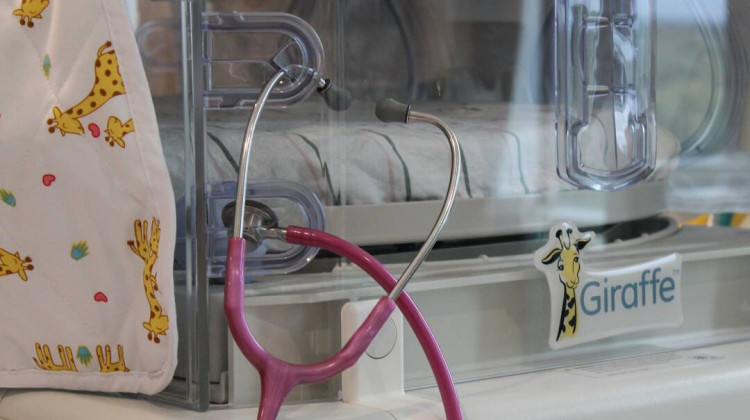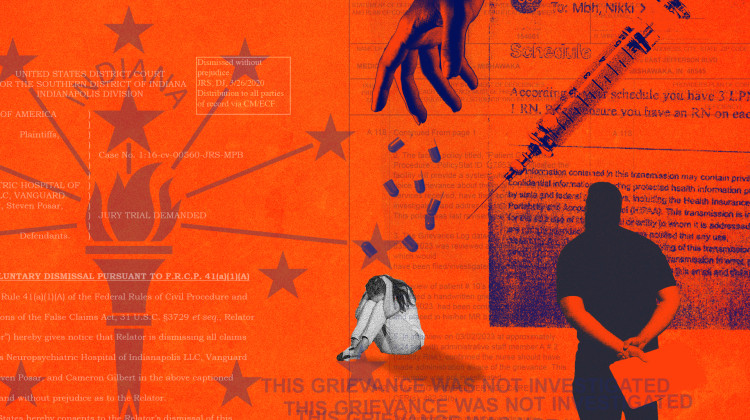MOORESVILLE -- An estimated 90,000 Hoosier children suffer from mental health disorders, yet mental health diagnosis and care plans in the state are not standardized. One mother’s work to establish treatment for her daughter puts a spotlight on the problem.
Twelve-year-old McKenzie Ashkettle, has had more than one second opinion.
"She’s been diagnosed with Asperger's, bi-polar, bi-polar with phsycotic features, ADHD, ODD, EH, pervasive delopment disorder," explained her mother, Amber Becker.
She began her search for answers over six years ago, the first time McKenzie was admitted to a mental health facility.
"She’s been kicked out of so many facilities and everyone blames it on the other one. Mental health says it’s autism. Autism says it’s mental health. And then they say it’s medical. Medical says it’s mental health. So nobody wants to take responsibility," Becker said.
At her small clothing store on Main St. in downtown Mooresville, Becker flips through piles and piles of folders and documents. Her records point to the issue that mental health care diagnosis and treatment are not standardized. There is no set map to care. Without this, some children struggle.
Becker says she’s seen this happen firsthand.
"Keep them for a couple days, say they’re ready for discharge," Becker said. "But they’re on so much medication, and once the medicine wears off you’re right back to square one."
Three years ago, Becker decided she needed to try something else, after a particularly violent crisis episode.
"When the cops came in they had to physically restrain her she was taking things from the floor like bobby pins and trying to stab them, spitting at them, kicking them," Becker recalled.
McKenzie was admitted to the hospital and Becker contacted the Department of Child Services. They said it wasn’t an immediate emergency and they would open a case and follow up in a few weeks. The counselor failed to tell her about a new initiative to help children in need of mental health services.
The Children’s Mental Health Initiative, or CMHI, was started in 2012. Every county has an access site that can help families navigate funding, finances and treatment systems.
Service manager with the Department of Child Services, DCS, Katie Connel says the initiative has been able to aid around 800 children in the past few years.
"There wasn’t that avenue to get to those mental health services without joining and going into a system," Connel said. "Our program is using our funding. We’re flexible. We’re trying to blend it and braid it for kids in the state."
Because she didn’t now about this program, Becker sued the state for assistance. That’s when she was informed about the CMHI, and DCS agreed to pay for residential treatment.
Dr. Leslie Hulvershorn is the Director of the Dual Diagnosis Clinic at Riley Hospital for Children at Indiana University Health. She says many still struggle to find continuity of care; and when it comes to mental health, people can’t expect the same options as with other illnesses like cancer.
"I think one could argue that we should have way more research, way more treatment options than we do for cancer but in fact it’s very much the reverse," Hulvershorn said.
Hulvershorn says shortages on every level from federal funding to hospital prioritization make it difficult. Mental health is a money loser.
"A hospital has to say, 'we’re going to have a psychiatric unit because we know it’s important, even though it's a money loser,'" Hulvershorn said "… and in fact these disorders are even more lethal because the number two cause of death for adolescents is suicide."
As Becker flips through all her records, she says they are still lacking answers. One doctor points to abnormal genetic testing and another to unexplainable brain mapping. In one case, a doctor flatly told her that her daughter would never lead a normal life.
"I just don’t know… I refuse to look at it that she’s never going to get married and never hold a job," Becker said, "and he told me that if we were wealthy we could get the services she needs."
The court case to provide funding for her daughter’s care is still open.
 DONATE
DONATE







 View More Articles
View More Articles



 Support WFYI. We can't do it without you.
Support WFYI. We can't do it without you.